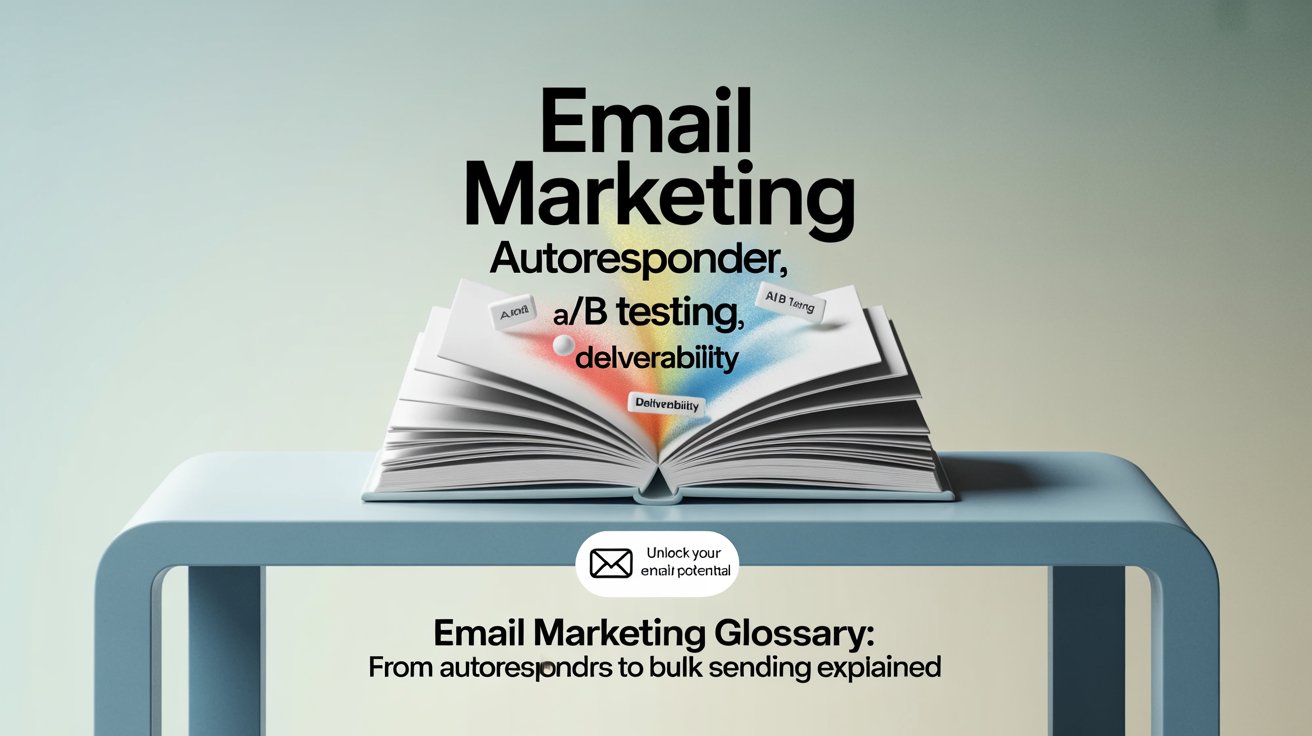In the rapidly advancing field of digital marketing, email continues to be one of the most powerful channels that engages the audience. While your email might include newsletters, transactional emails, or promotional offers, it is important to know the terminology surrounding email campaigns. This glossary serves as the ultimate guide of important things to know regarding email marketing, from Autoresponders to Bulk Sending, with all additional Altruism behind improving performance, more specifically the clickable rates.
Taking a moment to review these fundamental concepts is something every marketer, business owner, or content creator should know.

1. Autoresponder
An autoresponder is a scheduled email that is sent in response to a particular action, i.e. signing up for a newsletter, or downloading a PDF. Autoresponders can help ensure communication is timely and predictable.
Key Functions:
- Welcome to our new subscribers
- Confirm orders or sign-ups
- Provide access to the content requested
Email Automation services usually handle these limitations easily, autoresponders are a primary function of most Email Marketing Software.
2. Email Campaigns
Email campaigns involve a coordinated sequence of emails sent to a group with the intention of executing one of the following goals: product promotion, event invitations, raising brand awareness, etc.
Key Characteristics:
- Usually part of a greater marketing strategy
- Sent to a specific segment or audience
- Time sensitive or recurring (ex: weekly email newsletter)
It is important to monitor your click-through rate, and most importantly, during your email campaign – it shows you the amount of recipients that are actually engaging with your email and continuing down the funnel.
3. Bulk Sending
Bulk sending may just simply be sending the same email content to a broad list of subscribers! It’s commonly known as a newsletter or a promotional blast and it is available in almost every Email Marketing Tool.
Things to think about:
- Excessive use may lead to unsubscribes
- Spam filters are more sensitive to bulk messages
- Must always be permission based
When moderate use of bulk sending is applied, it is an effective use of emailing. Track metrics such as open rate, and click-through-rate for evaluation of the success of your larger email broadcasts.
4. Email Automation
Email Automation allows you to send emails based on triggers or time periods, without any manual actions. This could include things like welcome emails, reminders for abandoned carts, or birthday emails.
Common Automation Triggers:
- Subscription sign ups
- Purchase history
- Website activity
Email Automation enables businesses to maintain consistency and relevance while improving user experience, as well as increasing your click-thru rate with timely, relevant content.
5. Click-Through Rate (CTR) — The Core Metric
What is Click-Through Rate?
Click-through rate (CTR) is the percentage of subscribers who clicked on a link in your email versus all the people who received or opened it.
CTR = (Total Clicks / Total Delivered or Opened Emails) x 100
Why It Matters:
- It is a direct measurement of engagement.
- A higher click-through rate suggests greater interest in your content or offer.
- It can help refine content, subject lines, and call-to-actions.
How to Improve Your Click-Through Rate:
- Use powerful and concise CTAs
- Optimize your emails for mobile
- Segment your list to better message your audience
- Test Subject, Time and Types
Most Email Marketing Software includes reports on click-through tracking to better help you measure the effect of your email campaigns.
6. Email List Segmentation
Segmentation is the process of separating your subscriber lists into smaller targeted groups to improve click-through performance and relevancy based on behavior, demographics or interests.
Examples of Segmentation:
- Recent purchasers versus browsers
- Users from Germany versus the United States
- Subscribers who show an interest in Product A but not Product B
Segmentation drastically improves your click-throughs – because the content is directly relevant to the reader. Most sophisticated Email Marketing Tools have options for dynamic content blocks that operate based on the rules you establish for your segments.
7. Bounce Rate
Bounce rate gauges the portion of emails that could not be delivered, and can be categorized into two types:
- Hard bounce: A permanent failure (ex: fake email address)
- Soft bounce: A temporary failure (ex: inbox full)
A high bounce rate can hurt your sender reputation. Keeping lists clean is vital to good delivery—and metrics like your click-through rate.
8. A/B Testing
Also called split testing, you would send two variations of an email to a small part of your list to see which performs better.
You Can Test:
- Subject lines
- Email design
- CTA placement
- Send time
Testing before a full scale email campaign allows marketers to more reliably increase clicks and other KPIs.
9. Call-to-Action (CTA)
A CTA is the thing that encourages your reader to take action: they might click a button, watch a video, make a purchase, or read a blog post.
Best Practices:
- Visually distinguish it
- Use action verbs: “Buy Now”, “Read More”, “Get My Coupon”
- Use it strategically (utilize the top, middle, and end of longer emails)
An effective call to action is usually the difference between a high click through rate and a low click through rate. Most good Email Marketing Tools allow you to easily edit and test CTA buttons.
10. Email Templates
Email templates are pre-designed formats you can modify and utilize again. Most Email Marketing Software has a collection of responsive templates.
The benefits are:
- Save time on layout design
- Make sure you are mobile compatible
- Maintain your brand parameters
Templates also confine you to delivering well-proportioned emails which improve a click-through rate as the reader’s eye is led naturally down to the CTA.
11. Unsubscribe Rate
This percentage refers to the people who have opted out of your emails. It’s natural to have some opt-outs, but a sudden increase should be a cause for concern.
Reasons for High Unsubscribe Rate:
- Email too frequent
- Content not aligned
- Email doesn’t have value or is poorly designed
The right mix of value-focused content and good segmentation for your email campaigns keeps your list engaged—and hopefully, your click through rates healthy.
12. Deliverability
Deliverability refers to your email ability to reach the inbox (not the spam folder). Some good practices are:
- Avoid spammy subject lines
- Use verified sender domains
- Keep bounce rates low
If your emails are not delivered correctly, they cannot be opened, much less clicked. The better the deliverability = better opportunity for click through rates.
13. Open Rate vs. Click-Through Rate
These two metrics are often confused. Here’s how they differ:
| Metric | Measures | Useful For |
| Open Rate | Emails opened | Gauging subject line performance |
| Click-Through Rate | Links clicked | Measuring engagement with content |
Both are essential, but CTR gives a more accurate picture of how compelling your message and offer truly are.
14. Email Marketing Software Features to Look For
When selecting Email Marketing Software or an Email Marketing Tool, make sure it includes:
- Automation workflows
- Ability to segment audience
- A/B Testing
- Library of email templates
- Analytics (including click-through rates)
Selecting the right tool contributes to better campaign planning and more precise insights into performance.
15. GDPR and Consent
GDPR is especially critical in Germany and the EU, and it requires explicit, informed consent to collect, store, and work with email information. Always ask for explicit permission before adding someone to your list.
Why it matters:
- You can be fined heavily for an infraction
- It helps build trust with your audience
- People who are on a consent based list have better click-through rates
Always use Email Automation options like double opt in and preference centers to remain compliant.
Final Thoughts
It doesn’t matter if you’re new to Email marketing or updating an established Email marketing program. Knowing the definitions of terms like autoresponders, segmentation, and click-through rate is crucial to realizing results. Click-through rate and other metrics that you may hear about, are not just silly numbers, they are indicators of how well the content of your email campaign is performing.

